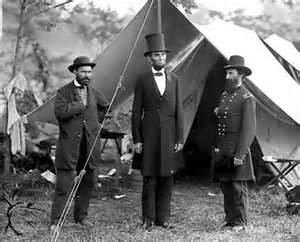The Life and Legacy of Abraham Lincoln
Part 4: And in the End
The election campaign was very much a referendum on the war effort. Residents of Southern states weren't voting, of course. In the North, public opinion was by no means 100 percent behind the war effort. Hoping to capitalize on this, the Democratic Party named Lincoln's former top general, McClellan, as its presidential candidate. During the latter days of the election campaign, the Union troops began to deliver. Sherman captured Atlanta in September. Union General Philip Sheridan finally won a victory in Virginia's Shenandoah Valley, in October. And Admiral David Farragut won control of Mobile Bay, giving the Union complete control of the Mississippi River. As a result, Lincoln won re-election, with 55 percent of the popular vote and 212 of the 233 available electoral votes. A month later, Sherman reached Savannah, ending his "March to the Sea," which devastated the land and the infrastructure in a 60-mile-wide path. Lincoln was inaugurated on March 4, 1865. Three weeks later, Lee surrendered to Grant at Appomattox Court House, ending the war. Lincoln didn't get to enjoy much of it, however. On April 14, he was killed while watching a play at Ford's Theater, in Washington. The assassin was John Wilkes Booth, who escaped but was later hunted down. Lincoln's death was part of a larger plot, but no other high-ranking public officials were harmed in the end. Lincoln, shot in the head, lay in a coma most of the night and then died the next morning. His Vice-president, Andrew Johnson, became President.
Abraham Lincoln is remembered for his determination to preserve the Union, his well-known speeches and political campaigns, and his tenacity in the face of prolonged depression, both personal and national. His steely resolve gave the Union and its armies the impetus to remain in the fight until the tide had returned, and his actions to improve the lives and prospects of former slaves are remembered to this day for their importance and their vision. First page > Humble Beginnings > Page 1, 2, 3, 4 |
|
Social Studies for Kids
copyright 2002–2026
David White



 Speeches wouldn't win the war, though, and Lincoln knew it. In March 1864, frustrated again with his top commander's refusal to pursue the enemy, Lincoln named Grant as General-in-Chief of all Union armies.
Speeches wouldn't win the war, though, and Lincoln knew it. In March 1864, frustrated again with his top commander's refusal to pursue the enemy, Lincoln named Grant as General-in-Chief of all Union armies.  In the aftermath of the war, the Union accepted the Confederate states' return while also passing a series of constitutional Amendments. The
In the aftermath of the war, the Union accepted the Confederate states' return while also passing a series of constitutional Amendments. The 
